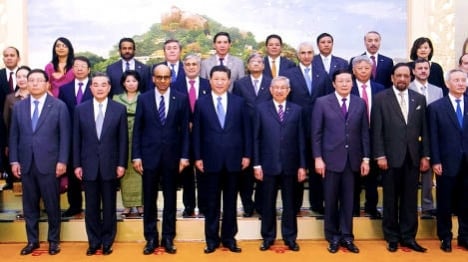BANK
Norway joins China bank despite Nobel spat
A total of 57 countries have been approved as founding members of a new Chinese-backed infrastructure bank, Beijing said on Wednesday, including Norway, despite relations being in a diplomatic deep freeze since a Chinese dissident won a Nobel Prize.
Published: 15 April 2015 10:08 CEST

Chinese president Xi Jinping with heads of delegations following the signing ceremony of the Memorandum of Understanding (MOU) on Establishing the AIIB. Photo: AIIB
No nations that formally sought to become founding members of the Asian Infrastructure Investment Bank are known to have been refused, although Taiwan, the self-governing island that Beijing regards as part of its own territory, had its application rejected.
The latest seven countries approved as founding members by Wednesday's deadline were named by China's finance ministry as Sweden, Israel, South Africa, Azerbaijan, Iceland, Portugal and Poland.
They bring the total number of founding members to 57, including four of the United Nations Security Council's permanent five, 14 of the 28 European Union countries, and 21 members of the 34-strong Organization for Economic Cooperation and Development (OECD).
The line-up does not include the United States or Japan but represents a diplomatic coup for China after close US allies such as Britain, France, Germany and Australia decided to participate even after Washington initially opposed them signing up.
The institution is aimed at financing infrastructure development in Asia but critics have expressed concern about its standards and that it could rival the US-led World Bank and the Asian Development Bank, which is headed by Japan.
China has repeatedly said the institution is "open and inclusive" and Norway's approval came despite Beijing cutting all high-level ties with Oslo after the Nobel Peace Prize went to Liu Xiaobo in 2010.
The Norwegian government has repeatedly maintained that the Nobel Committee is independent and makes its own choices, but Chinese authorities have torpedoed any attempts at normalizing relations.
Taiwan, which Beijing regards as part of its territory awaiting unification since a civil war in 1949 and as such opposes international recognition for it, had its application for founding membership rejected. China said it would
welcome the island to join in the future "under an appropriate name".
Url copied to clipboard!


 Please whitelist us to continue reading.
Please whitelist us to continue reading.